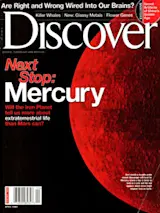Lawrence Smart, secretary of the Smithsonian, gets two years’ probation for buying art objects containing feathers from protected birds.
Purdue scientists identify an intestinal cell protein that could lead to a vaccine against Listeria, a bacterium that causes food poisoning.
University of Colorado physicists create a “fermionic condensate,” an important step toward room-temperature superconductivity.
Entomologists at Penn State report that plants attacked by caterpillars produce a chemical to attract predatory insects.
Following a political and scientific outcry, NASA rethinks its early-retirement plans for the Hubble Space Telescope.
A British study estimates that radiation from diagnostic X-rays causes nearly 1 percent of cancer cases in the United States.
A joint American-Russian team claims they have created two new elements, numbers 113 and 115 on the expanded periodic table.
Chinese scientists say they have cloned the Siberian ibex, an endangered Asian goat, hoping to save it from extinction.














